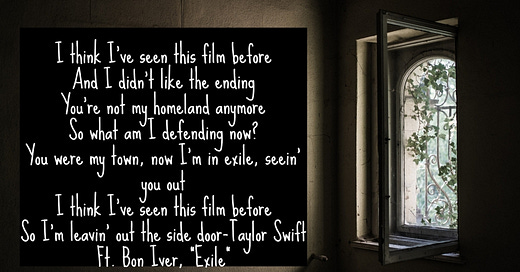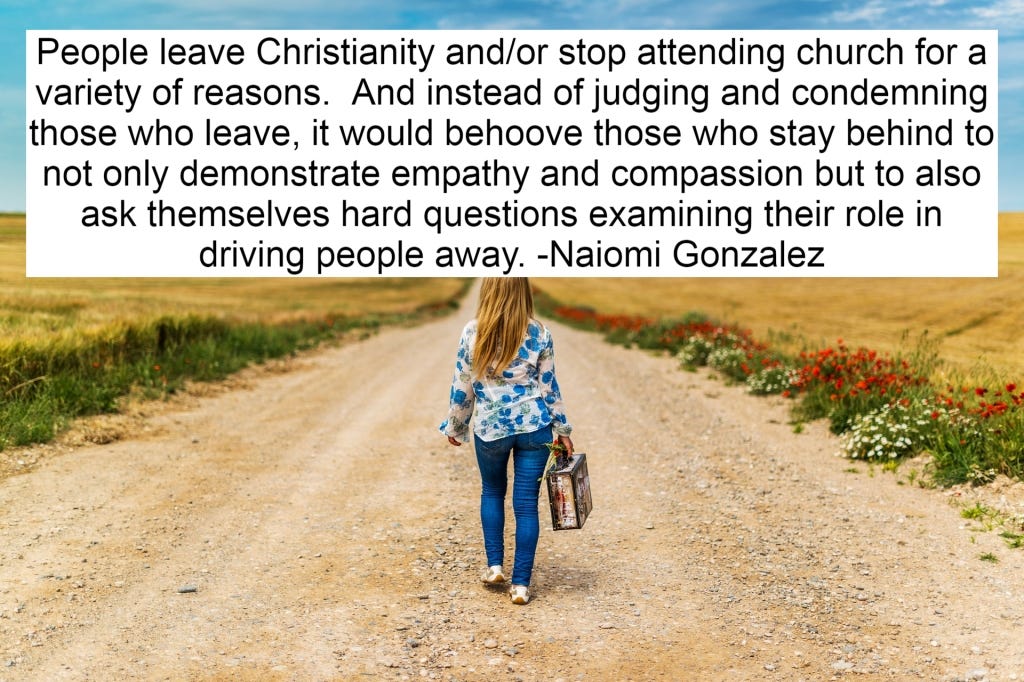Exile: Leaving the Place You Called Home
Fourth in my Taylor Swift and Theology Series.
But many of the priests and Levites and heads of families, old people who had seen the first house on its foundations, wept with a loud voice when they saw this house. Ezra 3:12 NRSV
I think I've seen this film before
And I didn't like the ending
I'm not your problem anymore
So who am I offending now?
You were my crown, now I'm in exile, seein' you out
I think I've seen this film before
So I'm leaving out the side door- Taylor Swift ft. Bon Iver, “Exile”
Why do people leave the church and/or Christianity? Especially in light of plateauing or declining memberships and the rise of the “nones” and the “spiritual but not religious,” Christians and individual denominations and churches have been asking themselves this question.
Some have answered by blaming those who leave for not being “faithful” enough. These people left because they didn’t truly want to follow God and they weren’t committed to their faith. On the more progressive side, some pastors insist that people who leave Christianity/their church are doing so because they aren’t committed to living in community. They want to be able to do and believe what they want without the accountability of a larger community.
Maybe there is some truth to those claims. Maybe there are people who leave Christianity and/or stop attending church because Christianity no longer served their wants and needs. Maybe, they were forced to go to church by family members and never clicked with Christianity (or specific versions of Christianity).
Instead of demonizing those who leave for those reasons, the Church should acknowledge those reasons as valid and respect those who made said choices. The Church should also acknowledge that not attending church is not equal to leaving Christianity. Believe it or not, people can be faithful, committed Christians without attending church.
But as valid and true as those reasons may be for other people, another reason why people leave Christianity and/or stop attending church is simply because Christianity and the Church has caused irreparable harm to some people.
I’ve heard the phrase, “the Church is a hospital for the sick not a museum for the saints” from people, across the theological spectrum. Yes, no one is perfect. The church, like other institutions reflect that truth. And participating in these institutions, means allowing some grace for the imperfections of others. But let’s be honest, that phrase has become an excuse to try and guilt people into attending toxic, harmful churches.
The fact that the church is filled with imperfect people, doesn’t give it a free pass to actively harm others. And too often, the Church is a safe place for abusers and the power hungry, not the vulnerable and marginalized. For instance, he focus on sexual abuse has often been on the Roman Catholic church because of the shocking number of those harmed and how widespread the covering up of said abuse is.
But Protestant denominations are not immune to protecting abusers. In fact, the sheer number of different Protestant denominations in existence and the fact that so many congregations seem to operate in their own little silos, makes naming and calling out sexual, physical, and other forms of abuse difficult. No one should be forced to stay within a congregation or denomination that refuses to take seriously abuse and punish abuses.
However, even congregations that don’t actively harbor abusers or who claim to welcome Queer people and fight against racial injustice, can be unsafe places. How many predominantly white “progressive” congregations that openly advocate for Queer people and go to rallies proclaiming Black Lives Matter, also, inadvertently or not, treat Black and brown people like tokens and mascots to be shown off, while ensuring they never have positions of power within the congregation/denomination?
People who leave Christianity and/or stop attending church should be celebrated for leaving situations that have actively caused them harm. Their bravery should be celebrated. Because yes, they are being brave, especially for those whose faith and congregation were a major part of their lives. Leaving a place that was once home, even if that place was toxic and harmful, still hurts.
In “Exile," Taylor Swift and Bon Iver sing about a failed relationship, one characterized by missed opportunities and miscommunications, but more importantly, the song captures the longing and loneliness that comes with reflecting on a relationship that at one point felt like home but which ended up causing you so much pain.
In a similar way, for many people, Christianity is not just a casual belief system they only occasionally acknowledge as important, but it encompasses a whole worldview that structures their every day lives. Likewise, for these same people, attending church isn’t just a once-a-week social event. Instead, church becomes a second home. And for those of us who grew up in abusive/neglectful families, church can often feel like the only safe space we have.
So, when one must leave Christianity or a church we called home because of abuse or toxic theologies, it hurts. We are walking away from something that used to give us meaning and provide us with comfort. We might not be leaving a romantic relationship, but we are sometimes severing many relationships-friends with whom we would hang out with after church, the church parents and grandparents that unofficially adopted us, the little kids we would babysit. We are leaving behind the certainty of our beliefs to embrace the unknown.
Even if we return to Christianity or find another church, the pain and suffering we experienced at the hands of a harmful congregation, doesn’t just go away. We still feel the loss of not only of what was but all the dreams and hopes we had invested in that specific church or in that version of Christianity. We feel on a smaller scale certainly, like the priests and Levites, who having seen the splendor and glory of the first temple, can only weep at the foundation of the second temple. Yes, they are getting a new temple, signaling the end of their time in exile. But what they lost remains imprinted in their minds.
I’ve chosen to stay within Christianity, but I find myself a church nomad. Never quite belonging anywhere. And it sucks. Leaving my childhood church at seventeen was necessary, but at 31, I am still struggling to find a new place to call home.
There's something to be said, like in my last post, about staying within Christianity/a particular denomination and church and advocating for change. That takes courage. But leaving when an institution refuses to change or when they've hurt you, also requires bravery.
People leave Christianity and/or stop attending church for a variety of reasons. And instead of judging and condemning those who leave, it would behoove those who stay behind to not only demonstrate empathy and compassion but to also ask themselves hard questions examining their role in driving people away.




